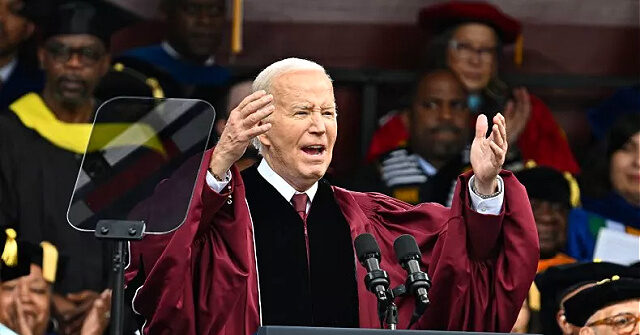The far-right news outlet Gateway Pundit is set to defend itself on Thursday against arguments that it is abusing the bankruptcy process amid significant new questions about the company’s finances.
A bankruptcy judge in Florida is set to consider a request from creditors – three people suing the outlet for defamation – to dismiss the bankruptcy case the company filed on 24 April. Jim Hoft, the founder of the site has implied he filed bankruptcy as a litigation tactic to delay a defamation case against his company by Shaye Moss and Ruby Freeman, two Georgia poll workers who the company allegedly spread false information about after the 2020 presidential election. The company denies publishing libelous claims about Moss and Freeman.
In a statement about the bankruptcy filing, Hoft said that the company “made the decision to seek protection under Chapter 11 of the United States Bankruptcy Code in the southern district of Florida as a result of the progressive liberal lawfare attacks against our media outlet”.
Hoft added: “This is not an admission of fault or culpability. This is a common tool for reorganization and to consolidate litigation when attacks are coming from all sides.”
The company filed for bankruptcy, which immediately paused the defamation cases, the day that Freeman and Moss’s lawyers provided notice they intended to take Hoft’s deposition. But the Gateway Pundit reported nearly $3.1m in gross revenue in 2023. His lawyer has conceded in hearings it is currently able to pay its everyday debts.
“It is already abundantly clear that this case is an abuse of the bankruptcy system,” lawyers for Moss and Freeman wrote in a filing on Tuesday. Their request was joined by Eric Coomer, a former Dominion Voting Systems employee, who sued the outlet for defamation in 2020 after it falsely accused him of being part of an effort to overturn the election.
Gateway Pundit has also denied publishing false claims about Coomer. Lawyers representing Hoft did not respond to a request for comment.
Two testy hearings this month have offered a glimpse into the company’s finances and attracted heavy scrutiny from creditors and a justice department lawyer overseeing the preliminary hearings.
“If I was in your seat, I’d be uncomfortable as well, but this was your choosing to be in that seat,” Martin Ochs, the justice department lawyer, told Bart Houston, an attorney representing the site on 18 June. “There’s a lot that’s gone on in here that has not been addressed,” he added. Hoft responded the next day with a post on the Gateway Pundit attacking Ochs and the bankruptcy process.
The defamation lawsuits are part of a series of cases across the US that are being watched to see whether libel law can be used as a tool to combat misinformation. Defendants in those cases, however, are increasingly using bankruptcy as a tool to try and delay or avoid payment altogether.
“The goal here seems clear: for the defamer to essentially make itself judgment-proof rather than facing the libel trial and the potentially staggering consequences for the lie,” RonNell Andersen Jones, a first amendment scholar at the University of Utah, said after the Gateway Pundit declared bankruptcy.
During the 17 June hearing, Ochs, as well as lawyers for Coomer, Freeman, and Moss pressed Hoft about three loans the company listed in its filings.
One was a $799,860 loan to Hoft to purchase a condominium apartment in Florida. The second was a $150,000 loan to a legal defense fund Hoft set up and controls. The third was a $21,000 loan to Hoft’s twin brother, Joe. The company also purchased a 2021 Porsche Cayenne that Jim Hoft uses as a company car and keeps at his home in Missouri .
Even though the transactions are all characterized as loans, Hoft said earlier this month that they were not formalized with any written paperwork, did not have an interest rate and could not say whether the money was being paid back. Hoft and his lawyers were unable to tell creditors the purpose of the loan to his brother
Hoft, who is the company’s only employee, said the company gave him nearly $800,000 to purchase a condominium in Jensen Beach, Florida, sometime in the late summer or early fall of 2021. The two-bedroom, two-bathroom apartment with “spectacular ocean views” and top of the line appliances, according to a 2021 listing, is in the same building where his brother, Joe, has an apartment. Asked why the company lent him the money, Hoft said: “I use it as a place of business because I work out of my home. The location was selected because my twin brother lives in the area and Joe was a contract employee at the time.”
after newsletter promotion
Hoft purchased the apartment through an LLC for $749,000. He said the extra $50,000 covered closing costs and other essential expenses for the apartment.
Jay Westbrook, a professor of bankruptcy law at the University of Texas, said the three loans were “questionable”.
“The loans are questionable because they are to an ‘insider’ and are apparently not made on commercial terms – no formal document, no interest, etc. Whether they can be challenged depends on a lot of facts,” he said. “The key point is that the LLC has a separate legal existence from the owner – that’s why it is established to protect the owner from the company’s debts – and therefore has to be managed as such. The company’s creditors have a right to expect it will be managed as such. In any event, a trustee in bankruptcy would be able to sue the borrower to collect the loans, again, depending on the facts.”
Lynn LoPucki, a bankruptcy law professor at the University of Florida, added that “transactions are voidable if they are made with ‘the actual intent to hinder, delay or defraud’ creditors”.
Christopher Hampson, a law professor at the University of Florida, added that “bankruptcy courts follow substance over form. Loans typically have interest rates and a repayment or maturity schedule. A financial transaction that doesn’t have those features is at risk of being ‘recharacterized’ as a gift, which is a problem for an insolvent debtor because the bankruptcy estate may be able to claw the transfer back.”
During the June hearings, Hoft and his lawyers have conceded that they can still pay the company’s debts. The company has a $2m insurance policy and has only used up $700,000 of it so far. The company declared bankruptcy, Hoft and his attorney say, because they were concerned that the cost of litigation would eventually exceed the $2m covered by the insurance. Lawyers for the creditors say that is not a valid excuse to declare bankruptcy.
Last year, Freeman and Moss won a $148.1m judgment against Rudy Giuliani for defaming them after the election. Giuliani, whose lawyer blamed the Gateway Pundit for the harm Freeman and Moss suffered, has since declared bankruptcy. Dominion Voting Systems and Fox also reached a settlement for $787.5m in a defamation suit in 2023.
Other than Freeman, Moss and Coomer, most of the other creditors in the case are contract writers for the Gateway Pundit. Hoft and the writers have asked the court to shield their names from becoming public because of the harassment they could face. Several of the writers have filed affidavits with the court detailing threats they have received.
Such disclosures are notable because Freeman, Moss and Coomer all say that their lives have been ruined because of articles the site published about them.


